GPBS TOKYO 2023 Report -Diversified Government Partnership, Enhanced Beneficiaries Capacity Building through pro bono04/03/2024
Diversified Government Partnership, Enhanced Beneficiaries Capacity Building through pro bono
Friday, December 1, 2023, 13:00-14:45
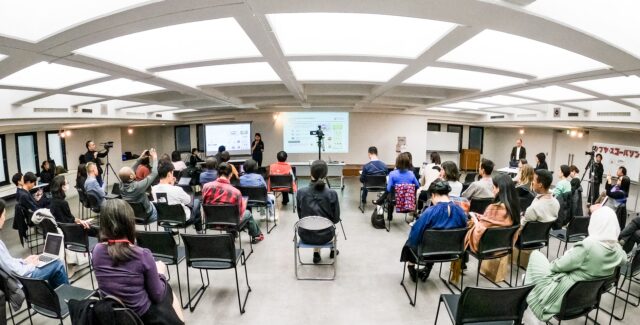
Venue: Shibuya Shoko Kaikan, 2F Main Hall
There are countless social issues, and numerous NPOs and community organizations are working to solve them on a daily basis. Pro bono has been steadily producing results in strengthening the organizational foundations of such NPOs and community organizations.
Looking at examples from around the world, we see initiatives that position pro bono as part of policy and create social impact, as well as numerous methods that leverage digital technology to more effectively and efficiently support nonprofit organizations in strengthening their infrastructure.
Based on the presentations at the “Global Pro Bono Summit TOKYO 2023” Seminar For Public and Social Sectorsheld on December 1, 2023 (Friday), this report will discuss how government agencies and intermediary support organizations can work with pro bono to help solve social issues, We will introduce hints on how to work together with pro bono organizations from various countries.
Table of Contents
Theme -1 Collaboration with Diversified Government Agencies
Strengthen volunteer management and promote pro bono participation
Erlinda Heng, National Council of Social Service, Singapore
Collaboration between government and pro bono support organizations
Frederick Sadia (VIO Society, Kenya)
Long-term case studies and pro bono involvement in a super-aging society
Ikuma Saga (Service Grant, Japan)
Theme -2 Evolving Methods of Supporting Organizations to Strengthen Their Infrastructure
Strategies for Expanding Pro Bono Activities and Development
Vicente Gerlach, Fundación Trascender, Chile
Evolution of beneficiary capacity-building methods
Jean Lau (Asian Charity Services, Hong Kong)
Evolution of Methods in Capacity Building of Workers
Jia Chuan Kwok (USA/Singapore, Conjunct Consulting)
Theme -1 Collaboration with Diversified Government Agencies
Strengthen volunteer management and promote pro bono participation
Erlinda Heng, National Council of Social Service, Singapore
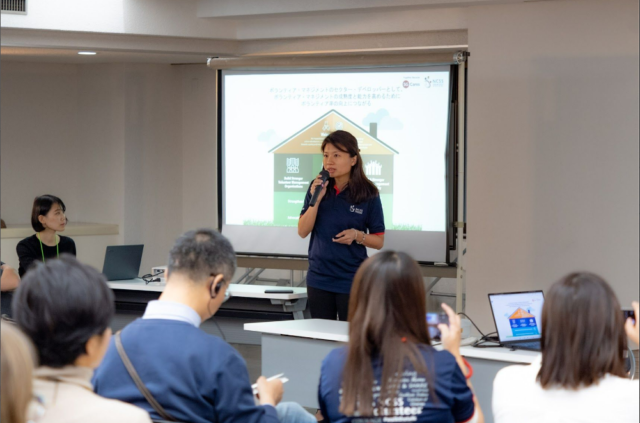
National Council of Social Service (NCSS) is the umbrella body for over 500-member social service agencies in Singapore. Its mission is to provide leadership and direction in enhancing the capabilities and capacity of its members, advocating for social service needs and strengthening strategic partnerships, for an effective social service ecosystem. NCSS also supports the development of Social Service Agencies (SSA) by leveraging the assets of partners and strengthening social service agencies’ volunteer management capabilities to ensure a sustained pool of volunteers. NCSS is also part of a national movement called SG Cares, which is dedicated to guide and support the goodwill of all who live in Singapore to better help those in need, to make Singapore a more caring and inclusive home for all.
In 2020, NCSS published the Volunteer Management Toolkit (VMT) 2.0 to guide SSAs to put in place good volunteer management practices to attract and retain volunteers who can augment their capacity and capability, to better serve their beneficiaries. NCSS, together with Empact, also developed the Skills-Based Volunteerism (SBV) Toolkit to complement the VMT 2.0. The SBV toolkit provides useful tips, templates and case studies to guide and inspire SSAs on how skill-based volunteers can help them build up their organisational functions.
NCSS also promotes networks where volunteer management professionals gather to share about volunteer management. These resources are available for download on the NCSS Volunteer Resource Hub, and we hope you will find them useful.
Collaboration between government and pro bono intermediary support organizations
Fredrick Sadia , VIO Society, Kenya
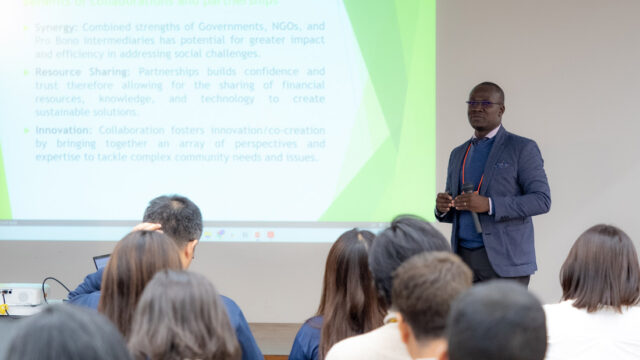
Partnerships between governments and pro bono organizations are strategic alliances. By addressing social issues with a strategic alliance, we can move forward with common goals for the development of the region. And to achieve our goals, we need to leverage all of our capabilities. We will use our skills and resources to achieve a single impact.
In Kenya, there is a trend that the government is becoming more willing to work with NPOs and pro bono intermediate support organizations. Based on our experience, we feel that it is important for the government, NGOs, and pro bono support organizations to work together.
The first is to create synergies by combining each other’s strengths and working together efficiently. The second is to provide each other with resources to solve problems. The third is to generate ideas and co-create.
Also important for success are clear goal setting, commitment, moving forward in a sustainable manner, and inclusion of all parties involved in the solution.
Issues of particular importance in Africa are agriculture and food security. Climate change also requires efforts to reduce CO2 emissions and improve access to electricity for those who are not well connected to the grid. Health and education cannot be ignored in relation to sustainable development, and collaboration with JICA in Japan is also taking place on science, innovation, and technology. We feel that gender and women’s empowerment will lead to community development. We are very pleased to see more and more women taking leadership roles in the Rwandan government in recent years.
To promote solutions to these challenges, the Kenyan government has made it a common goal to create a policy and legal framework. Toward this end, an environment is also being created to strengthen pro bono and volunteer activities. Efforts are underway across the country, and a bill related to this has been introduced in the current session of Congress, with the hope that it will be passed in the next session.
The support of NPOs and intermediary support organizations such as ours is important in the policy making of the Kenyan government.
When I was in high school, I met a Japanese volunteer teacher who taught me to have a sense of responsibility and the concept of mutual aid. With those experiences, I am glad that I am now in Japan through the connections of the pro bono network.
Relationship between Government and Pro Bono in the Case of Long-Term Collaboration Toward a Super-Aging Society
Ikuma Saga ,Service Grant, Japan
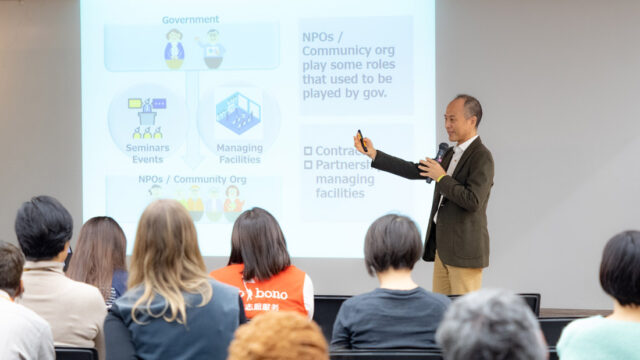
Japan is about to enter the year 2025, the year of the super-aging society, known as the “2025 problem. The “2025 problem” is that the so-called “baby boomers,” a large segment of the population, will be 75 years old or older, which will increase the need for nursing care and medical services, while decreasing the number of workers, which will increase the need for more support.
In response to this issue, Service Grant has been promoting an initiative called the “Tokyo Hometown Project” together with the Tokyo Metropolitan Government. While the importance of preventing the need for nursing care and helping each other’s residents in their daily lives is increasing, it has been said that Tokyo is a city with few connections between people. On the other hand, this project aims to support local organizations by harnessing the power of the many active businesses, their human resources, and people with expertise that exist in the area.
The Tokyo Hometown Project is a collaborative project with the Tokyo Metropolitan Government, and now in its ninth year, we have been able to provide stable support to organizations.
I believe that there are three types of collaboration model with the government. The first type is where residents make proposals to the government, and the government takes the initiative in implementing the proposals. The second type is where an NPO or other organization contracts with the government to carry out a project. The third type is one in which the government, local NPOs, citizens, and others share common goals and work together to advance them.
We, Service Grant Japan, as introduced in the third section, provide a platform for the government to collaborate with local NPOs and citizens to solve social issues.
We believe that this involvement is one reason why collaboration in government has been sustained.
Each government has its own policy issues and goals. In order to support community development, citizen participation, and voluntary activities by citizens, it is very important to create an environment where people can collaborate, but there are many aspects that are difficult to achieve through the conventional activity process of government. We hope to provide the power of an intermediary support organization such as ours to address these issues.
Theme – 2: Evolving Methods of Supporting Organizations to Strengthen Their Infrastructure
Strategy and program development to expand pro bono activities
Vicente Gerlach, Fundación Trascender, Chile
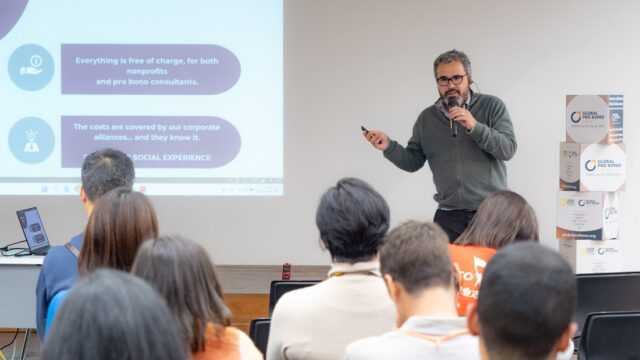
We, Fundacion Trascender, were founded in 2001 and now have three offices in Chile; we provide consulting services to 1,373 organizations and currently have 1,322 pro bono consultants; we have a 98% satisfaction rate from NPOs and a 96% satisfaction rate from pro bono consultants.
When a pro bono consultant’s hand is raised for a NPO’s need on our cloud, a match is made and the project takes place virtually. A member of the Foundation’s staff joins the project and watches its progress.
We provide free support to non-profit organizations, but our activities are funded by revenues from our collaborations with corporations. As ESG and governance indicators are becoming increasingly important for companies, we support companies in achieving their social goals and collaborate with them by helping them prepare sustainability reports.
We have a set of seven dimensions that are part of a strengthening pathway called “Index FT” that NPOs use to self-evaluate their activities. We conduct a one- to two-hour workshop for all NPOs to organize and evaluate their indicators, which we use to understand their consulting activities and to recognize their strengths.
The process of consulting to strengthen organizational capacity can take 2-3 years, but by clarifying the process, several initiatives can be supported in parallel, making it a beneficial activity. We also conduct “fixed offer” workshops every 6-12 months during the support to assess individual impact. We review results and impact in terms of capabilities and generated knowledge. 75% of NPOs say they saw positive results immediately after the support, and 90% rate their impact as achieved over a longer period of time.
Pro bono consultants are not paid and seek to satisfy beneficiaries, so strategies such as community building are important. Community building is an important issue, as it creates a satisfying environment for sharing experiences and knowledge among pro bono and in a virtual setting.
It is important to create community, to be part of a team, to work together, to build trust, and to evaluate and measure everything.
Evolution of Capacity Building Methods for Nonprofit Organizations
Jean Lau , Asian Charity Services, Hong Kong
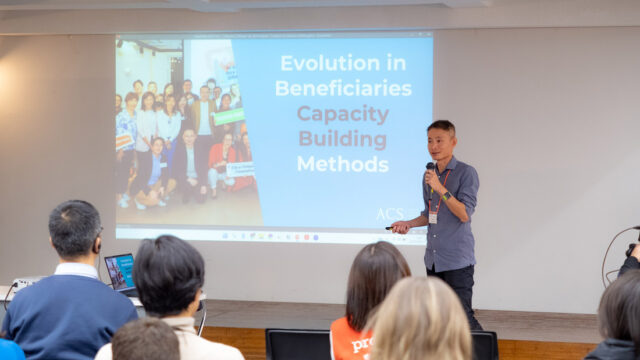
We have 2,000 pro bono consultants, and I would like to share with you some of the capacity-building (organizational capacity building) methods we are considering in our activities.
There have been several social shifts in the last few years alone. In terms of skills, there has been an increased demand for digital, creativity, and engagement. Culturally, people are more socially engaged, co-creativity, personalization, and the idea of time constraints has changed. Philanthropy has changed, with more demand for tangible results in a short period of time. As you know, there has been a social shift due to the impact of Corona, but even before that there were social protests in Hong Kong, leading to divisiveness. On the other hand, there has been technological evolution.
According to McKinsey data, by 2030, technology, social-emotional, and cognitive skills will be of greater importance.
In the midst of the culture shift, different generations have different strengths. Generation Alpha has the ability to co-create, Generation X has the ability to participate and execute, and Generation X has the ability to be interactive and collaborative. These are just a few hints on how to work effectively with pro bono consultants.
Recent data from the Drothy A. Johnson Center on the philanthropic shift underscores the rise of co-funding, a rethinking of capacity-building decision makers, and the need for effective management of NPOs vis-à-vis accountability.
Mapping, including topics related to individuals and organizations, can be divided into human capital, social capital, and capital on resources.
We use these frameworks and our human, social, and resource capital to create new projects for individuals, organizations, and communities. We call them new narratives, and we promote them.
Evolution and possibilities of support methods through the use of digital technology
Jia Chuan Kwok (USA/Singapore, Conjunct Consulting)
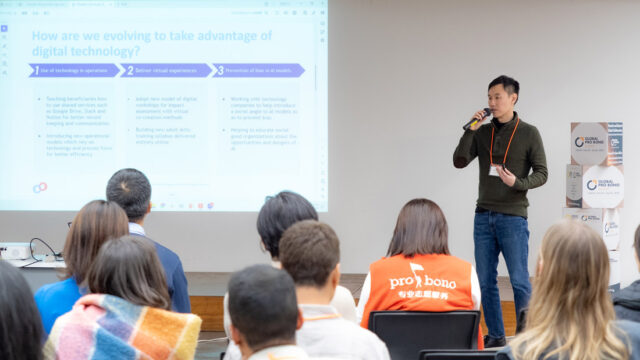
Conjunct Consulting is expanding our sphere of activity beyond borders to identify new opportunities for digital technology, especially in pro bono.
The world is becoming increasingly digital, but the challenges to tackle remain the same. Engaging human resources, encouraging action, and harnessing and expanding their potential. We want to develop to contribute to society. We hope to expand that potential through the use of new technologies.
Technology is a means to an end, and the goal is social impact and positive change for those involved in the NPO’s work. At Conjunct, we are working on three main axes.
The first is to introduce pro bono participants to free open-source tools that they can use to streamline processes in their activities. The second is to provide virtual experiences, such as digital workshops, to discover new co-creation possibilities.
And third, we prevent bias in the AI model. We work with technology companies to ensure that AI is introduced in an equitable manner, and we help NPOs deepen their knowledge of AI and understand its potential for their own use.
In Malaysia, there is an example of how digital has been used to improve communication in schools. Handwritten communication with parents was digitized to enable effective communication. In Singapore, we have implemented an initiative in the social sector to allow case managers to engage even those who normally would not have access to them by deploying their activities virtually. We are also using this technology in our marketing at awareness raising activities.
We learned three things;
1) the potential of digital technology in training and mentoring is broad and can transcend borders, 2) NPOs and others need to be patient and guide them through the implementation, practice, and use of new technologies in order to bring them to life and 3) the use of digital technology in training and mentoring is a critical part of the process.
While digital technology is expanding, many people are being left behind. We will continue to work on digital equity and engage in dialogue to create an environment where even these people can use digital technology to their full potential.




